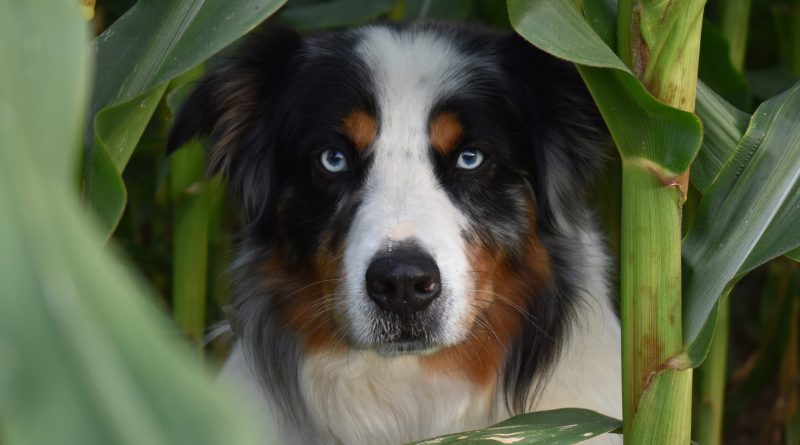Stalk About Nutritious: It’s Corn!
We’ve covered various myths about grains as a group in the past, but as the summer ends (sweet corn!) and we shift into fall (cornbread, corn stalks, corn mazes, candy corn!), it seems like an appropriate time to discuss the common myths about pets and corn. Now, obviously candy corn is not a good option for your dog or cat, but what about real corn?
Corn has an unearned reputation as being something that should be avoided for pets. Some pet foods specifically advertise that they have “no corn” as if this is a badge of honor and many non-veterinary sources suggest that corn isn’t digestible and “goes straight through” a dog or cat or is a “cheap filler”. Let’s unpack some of these myths and set the record straight.
- Can dogs and cats digest corn?
While whole sweet corn kernels can make it intact through the intestines of both dogs and cats (and humans!) and be visible in the feces, especially if not thoroughly chewed, this doesn’t mean that corn isn’t a safe and nutritious food. Like all grains, the digestibility of corn is greatly increased by grinding and cooking – corn meal or ground corn are common pet food ingredients that have been shown to be highly digestible (the starch component is 90-99% digestible in studies). One type of corn that should never be fed to dogs is corn that is still on the cob. Dogs fed corn on the cob, or who access cobs from the compost or trash, often swallow large portions of the cob which frequently cause gastrointestinal obstruction and require surgery to resolve.
- Does corn cause allergies in dogs or cats?
While grains and especially corn are often thought to be common allergens by pet owners, the scientific data does not support this perception. Overall, food allergies are uncommon in pets and the vast majority of pets with food allergies are allergic to animal proteins, not to plant proteins or grains. Corn is rarely confirmed to be the cause of allergies in dogs or cats; in most situations where a pet’s family thinks that corn is the culprit, it turns out to be a different ingredient, typically an animal protein (or, more commonly, unrelated to food allergy).
- Does corn cause inflammation?
Corn is an excellent source of the essential fatty acid, linoleic acid. Linoleic acid is an omega-6 fatty acid and it is required to be provided by the diet in dogs, cats, and humans. However, it should be balanced with other types of fats like omega-3s – if a diet has high amounts of omega-6s with little or no omega-3s, that can encourage the production of more inflammatory compounds. Experienced pet food formulators know what combinations of ingredients to use to result in a diet with adequate amounts of essential fatty acids and a healthy omega-6 to omega-3 ratio. The higher omega-6s from corn may be offset by fish or fish oil, algal oil, flaxseed or flaxseed oil, or even chia seeds. So, while corn as the only source of fatty acids in a pet food isn’t ideal, most foods will have a number of other ingredients providing other types of fat to balance it all out.
- Do dogs and cats get any nutrients from corn?
Corn can be a good source of energy from both starch (carbohydrate) and from fat (as mentioned above). Whole ground corn also contains some corn bran, which is an insoluble fiber source which can contribute to good fecal quality. Corn is also a good source of several B vitamins, magnesium, and potassium. It’s also an excellent source of carotenoids – compounds that are made by plants and suspected to have substantial health benefits – like lutein, zeaxanthin, and beta-carotene (a vitamin A precursor). We don’t know how much of these compounds pets (or people) should get from their diet optimally, but they are thought to contribute to why increased consumption of fruits and vegetables is associated with improved health in most studies in people as well as some in dogs.
- Does corn contain gluten?
While the protein component of corn is called “gluten”, it is quite different from the protein found in wheat, rye, and related grains that is associated with gluten-intolerance. Gluten intolerance is pretty rare in pets and has been confirmed only in a few families of specific dog breeds. But, even if a pet came from a breed with known gluten-related issues (such as a border terrier or Irish setter), there should be no reason why the pet won’t tolerate corn or corn gluten.
- Is GMO corn harmful for pets?
The majority of corn that is used for human and animal feeding in the US is genetically-modified (GMO) to be resistant to common herbicides. While discussions of the “evils” of GMO foods are easy to find, actual data to support any health risks to pets or people who eat GMO corn are scarce. Genetically-modified organisms require extensive safety testing prior to FDA approval. GMO corn strains have been available for more than two decades, yet no adverse health effects have been proven. Based on current data, there are no reasons to avoid GMO corn in pet diets.
The bottom line is that corn is a safe and healthy ingredient in pet food. Avoid giving your dog access to corn on the cob or empty cobs, but otherwise, don’t be concerned to see corn meal, corn gluten, or ground whole corn in your pet food ingredient list. It’s also okay to give your dog unflavored popcorn, cooked fresh corn that you’ve cut off the cob, or cooked frozen corn kernels as a treat – just don’t freak out if you see some of the kernels in the feces when you’re cleaning the yard!

